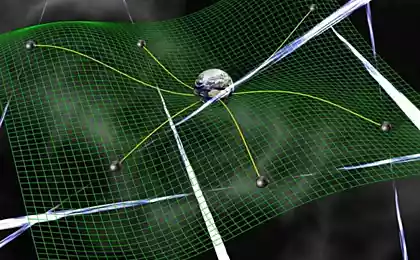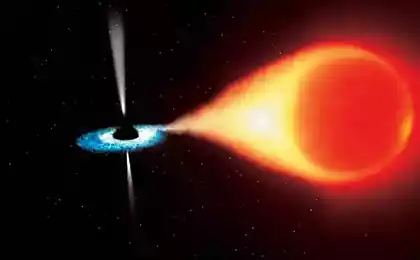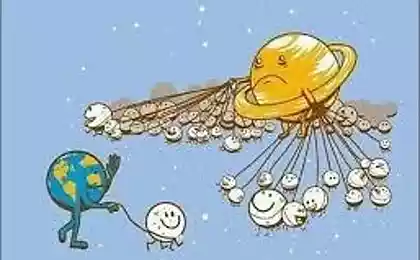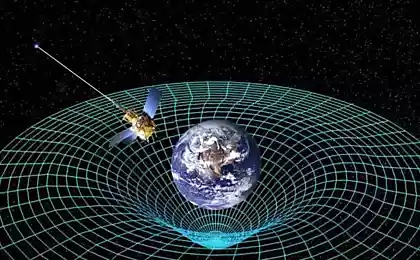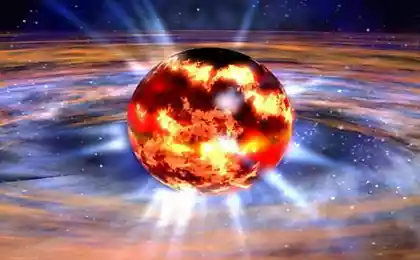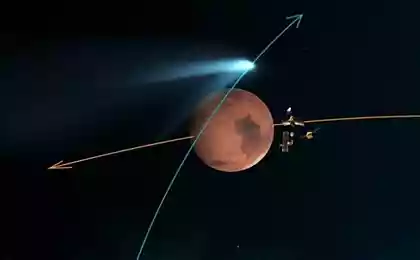495
How gravity might explain why time only goes forward

We can't stop time. Even in traffic, when time seems freezes and stops. Saving light in the daytime doesn't help, time will inevitably push forward. Why not back? Why do we remember the past and not the future? Physicists believe that the answer to this deep and difficult question may be hiding in the familiar to us all gravity.
The basic laws of physics don't care which direction time goes. For example, the rules that govern the orbits of planets work regardless of whether you are moving in time forward or backward. You can view the motion in the Solar system in reverse and they will look perfectly normal, without violating none of the laws of physics. What distinguishes the future from the past?
"The problem of the arrow of time is always worried about people" — says Flavio Mercati of the Perimeter Institute for theoretical physics in Waterloo, Canada.
Most people who think about the arrow of time, saying it is determined by the entropy, amount of disorder (chaos) in the system, whether it is a bowl of porridge, or the universe. According to the second law of thermodynamics, the total entropy of a closed system always increases. While the entropy increases, time moves in the same direction.
When an ice cube in your glass melts and dilutes your whiskey and coke, for example, entropy increases. When you break an egg, entropy increases. Both examples are irreversible: you can't freeze an ice cube in a glass of warm Cola or collect the egg again. The sequence of events — and thus time only moves in one direction.
If time's arrow follows the increase of entropy, and if entropy in the Universe always increases, then at some point in the past the entropy had to be low. Here comes the mystery: why does the entropy of the Universe at the beginning was low?
According to Mercati and his colleagues, there was no special, initial state at all. Instead, the state indicated time to move forward, came naturally in the universe under the dictation of gravity. This argument, scientists have uncovered in a recently published paper in Physical Review Letters.
To test his idea, scientists have modeled the Universe as a collection of thousands of particles that interact only through gravity and are galaxies and stars, floating in space.
Researchers found that regardless of starting positions and velocities at some point the particles inevitably find themselves clustered together into a ball, before again crashing to the ground. This point can be called equivalent to the Big Bang, when the universe is compressed into an infinitely small point.
Instead of using entropy, the researchers describe their system using the value which they call "entanglement" (complexity), defined as the ratio of the coarse distance between two particles that are further from each other than from rest, the distance between the two closest particles. When all the particles are clumped together, complexity is at a minimum value.
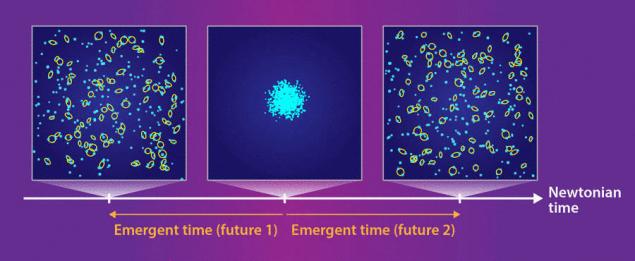
The key idea in all of this, as explained Mercati, is that this point the least entanglement arises naturally from the group of gravitationally interacting particles — no special conditions required. Entanglement increases as the particles disperse, representing both the expansion of the Universe, and the movement of time forward.
If that's not enough, the events that took place before the clustered particles — that is, before the Big Bang — was moving in the second direction of time. If you lose the events from that moment ago, the particles gradually scatter of clusters. Because this reverse confusion increases, this second arrow of time will point in the past. Which, on the basis of second time direction, is actually the "future" of another universe that exists beyond the Big Bang. Very confusing, agree.
This idea is similar to that of 10 years ago has offered physicists Sean Carroll and Jennifer Chen of the California Institute of technology. They tied the arrow of time with ideas describing inflation, the abrupt and rapid expansion of the Universe that occurred immediately after the Big Bang.
"What's interesting about this idea is that it is quite logical to contact us — Carroll said, describing his work applies to the arrow of time. — Perhaps the reason we remember yesterday and not tomorrow, remember, is the conditions associated with the Big Bang".
The directions time with a simple system of classical physics is relatively new, says physicist Steve Carlip from the University of California, Davis. New this — to give up entropy in favor of the idea of entanglement. The problem of entropy is that it is defined in terms of energy and temperature, which are measured by an external mechanism like a thermometer. In the case of the universe there is no external mechanism, so you need a value which does not rely on one of the units. Confusion, in contrast, is a dimensionless ratio and meets all requirements.
This does not mean that entropy need to give up entirely. Our daily experience — like your cool lemonade — relies on entropy. But when considering time at cosmic scales, you need to use the term entanglement, not entropy.
One of the main limitations of this model is that it is solely made on the basis of classical physics, completely ignoring quantum mechanics. It also does not include the General theory of relativity. There is no dark energy or anything else that is needed to create accurate models of the Universe. But researchers think about how to incorporate more realistic physics into the model, which subsequently could give the ability to make verifiable predictions.
"For me the big problem is that there is a great variety of different physical arrows of time," says Carlip. The forward direction of time most often manifests itself, it is not connecting gravity. For example, light always radiates from a lamp — never toward it. Radioactive isotopes decay into lighter atoms, never Vice versa. Why, then, arrow of time, which appeared out of gravity, pushing other arrows of time in the same direction?
"It's a big question, which remains open. I think unless someone else has a good answer to this question."
Source: hi-news.ru
Cyclist Francois Gissy has overtaken racing Ferrari (video)
Time Feeney —we are a million millionaires




